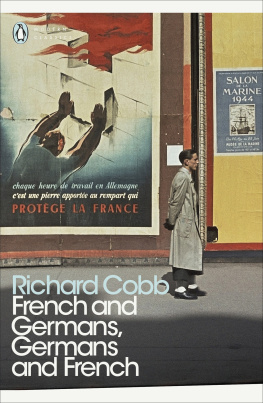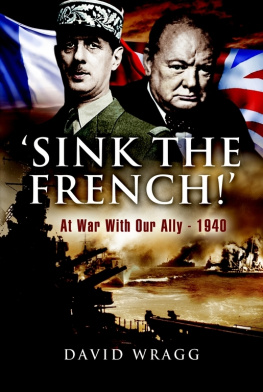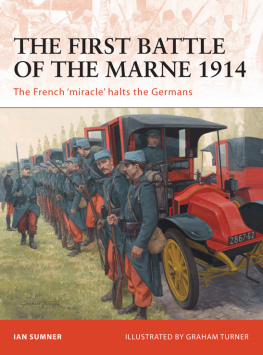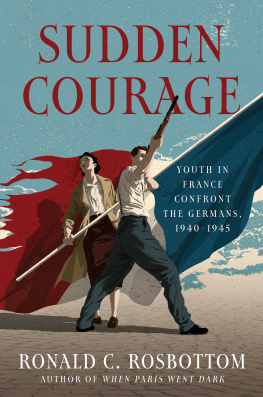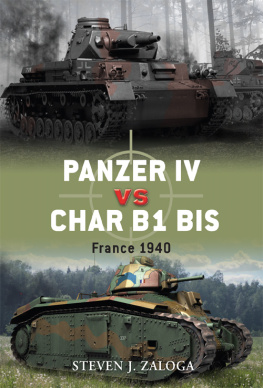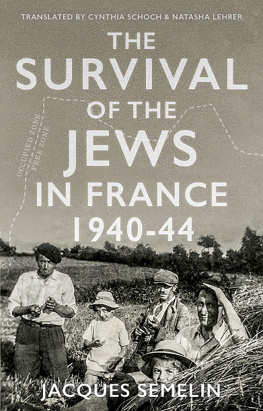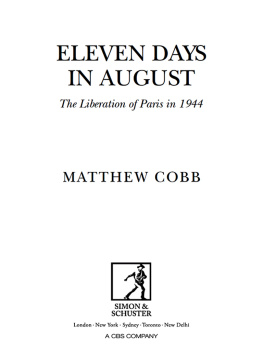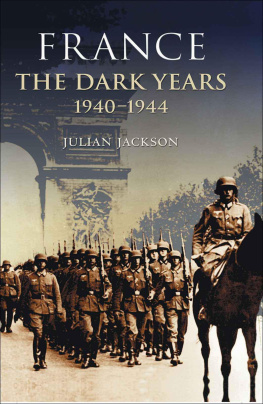PENGUIN MODERN CLASSICS
FRENCH AND GERMANS, GERMANS AND FRENCH
Richard Cobb (19171996) was one of the foremost modern historians of France. He served as an interpreter with British forces in France and Belgium from 1944 to 1946 and remained in France until 1955 researching his doctoral thesis, which became The Peoples Armies. He subsequently taught at the University of Wales, Aberystwyth, Manchester University and Leeds University. He spent the rest of his life at the University of Oxford, ultimately becoming Chair of Modern History. As his entry in the Dictionary of National Biography states: his idiosyncratic character, unrestrained opinions, strong likes and dislikes, and fondness for liberal, noisy entertainment gave him something of a legendary reputation among students and colleagues.
His major works include The Police and the People (1970), Paris and its Provinces (1975) and Death in Paris (1978). He also wrote a sequence of memoirs, Still Life: Sketches from a Tunbridge Wells Childhood (1983) being a startling celebration of oddness. Perhaps above all it is as a uniquely brilliant writer of essays that he will always be valued, some of which are gathered in Paris and Elsewhere.
He won the Wolfson History Prize in 1979, and was made Commander of the British Empire and chevalier of the Lgion dHonneur.
Richard Cobb
FRENCH AND GERMANS, GERMANS AND FRENCH
A Personal Interpretation of France under Two Occupations, 19141918 / 19401944

PENGUIN CLASSICS
UK | USA | Canada | Ireland | Australia
India | New Zealand | South Africa
Penguin Books is part of the Penguin Random House group of companies whose addresses can be found at global.penguinrandomhouse.com.
First published in 1983
First published in Penguin Classics 2018
Copyright Richard Cobb, 1983
Translations copyright Penguin Random House, 2018
First published for Brandeis University Press by the University Press of New England as a volume in the Tauber Institute for the Study of European Jewry series
Published by arrangement with the University Press of New England
The moral right of the author has been asserted
Cover photograph World War II advertisements and propaganda
Paris, 1944. by Andr Zucca. Bibliothque historique de la Ville de Paris. Andr Zucca/BHVP/Roger-Viollet/Topfoto
ISBN: 978-0-241-35132-1
In memory of my friend
Christopher Lee,
poet, teacher and man of peace
(Franco-German conversation piece, winter 1916, from Vie et mort des Franais, Ducasse, Meyer and Perreux)
Je dois avoir six ans, cest en 1917. Je suis avec Roger, mon grand frre. Des hommes en bleu, rien que bleu, des soldats, un rgiment qui passe. Ran! Ran! sur les pavetons les ils barraient ces pauvres mecs.
Avec Roger on a fait un dernier signe, et par les rues bordes darbres, vides nouveau, on est rentrs
(Robert Lageat, Robert des Halles)
Where indicated, German and French translations appear at the end of the text.
Preface
In January 1920, when I was about two and a half, my mother started what she called a Book of Richard in a small notebook with hard black covers, which I found among her papers after her death at the age of eighty-five, in 1962. It is a very private chronicle of no literary pretension and little general interest, devoted as it is to most of the things that a mother might note about a small child: the struggling, squeaky beginnings of speech and of counting, the appearance of first teeth, then their loss, the first visit to a dentist, the recurrence of coughs, colds and tummy troubles, the tantrums provoked by the onset of some awful childrens party (a form of torture common in middle-class circles in southern England in the 1920s), the first departure for school, the first time on a train, and the growing evidence of naughtiness (though I was glad to note that my worst crime the havoc caused by my air gun to some forty windows each still had a white circle of paint in the middle, as if in invitation to target practice in a block of new houses and to the green buses of the Autocar company, and the consequent loss of a Kruger sovereign had remained undetected).
From my Book I learn, among other matters of private interest, that in May 1924, at the time of my seventh birthday, while staying with my uncle, a doctor in Chelsea, having noticed Made in France on the back of a dinner plate, I remarked, at table: the lavatory was made in the Midlands (this rather acute social observation referred undoubtedly to Royal Doultons standard pan, Golden Flush, in willow-pattern blue on a white background I think most children would be attentive to the colour, design, and wording of the interior of a lavatory pan).
Now for teeth. I had eight at nine months, and lost my first tooth in gingerbread in June 1923. I had already had my first visit to the dentist two years earlier. But there is no more about teeth. Alas! I could fill in the missing chronicle of dental decay, extractions, the drill, agonizing fillings, even more agonizing killing of nerves with a squiggly instrument, for teeth have provided me with the most reliable and consistent private calendar. All the most important events of my career have been marked and emphasized by the accompaniment of agonizing toothache: my award of a scholarship to Oxford in December 1934, and, above all, what should have been the happiest day of my life, my release from the British army and my return to a civilian status, longed for every day of the previous four-and-a-half years. (I used to say to myself that, if I ever returned to civilian life, I would never, never complain, and that I would remind myself, if things seemed particularly gloomy, that at least I was no longer in uniform: a therapy that has worked wonderfully well for the last thirty-eight years even though, after all these years, I still have recurrent nightmares in which I am remobilized.) In September 1946, the complicated process of demobilization, spread over from Iserlohn, via Mnster, Harborn where we were disarmed (and how infinitely glad I was to see my sten go!) and Hull, to the demobilization camp at Guilford, took, in all, just over a week, but the joy of escape from uniform and of survival was marred by continuous jagged pain, day and night, and only slightly checked by regular intakes of schnapps. The very first act of my free life as a civilian was to have myself driven by taxi to a dentist in the Edgware Road the taxi driver assured me he was cheap. Smelling of whisky, this very drunken Scot injected me with a dirty needle I had noticed him wiping it on his blood-stained white (or once white) coat, and had been past caring (it was too late anyway) with the result that, on my second day as a free civilian, my gum swelled up with pus, causing a second visit, this time to a more reputable dentist, on Mount Ephraim, Royal Tunbridge Wells, who set about draining my gum.
Earlier, before my release from military servitude, while in Iserlohn, I had had recourse to a German (civilian) dentist, in an impeccably clean white coat a very rare article in the Ruhr in 1946 whose assistant provided the power for the drill by riding a bicycle contraption and whom I paid, most gratefully, in cigarettes. Earlier still, while in a sealed camp in May 1944, I had had a tooth extracted by a Cypriot dentist who sweated in the effort. In a very long chronicle of pain, set like background music a sort of dental obligato to public events, one occasion springs out as agonizingly and unrelentingly as the week-long top-jaw throb of demobilization. I had had a nerve killed on one of my visits to the dentist on Mount Ephraim. I had then started to walk home across Tunbridge Wells Common when, all at once, the nerve started on a prolonged death agony during which I lay writhing on the ground, looking at the 1916 tank which used to stand, throughout my childhood it was removed, for some reason, at the beginning of the Second World War outside the General Post Office on a little triangle of grass. Oh yes! I could fill in

